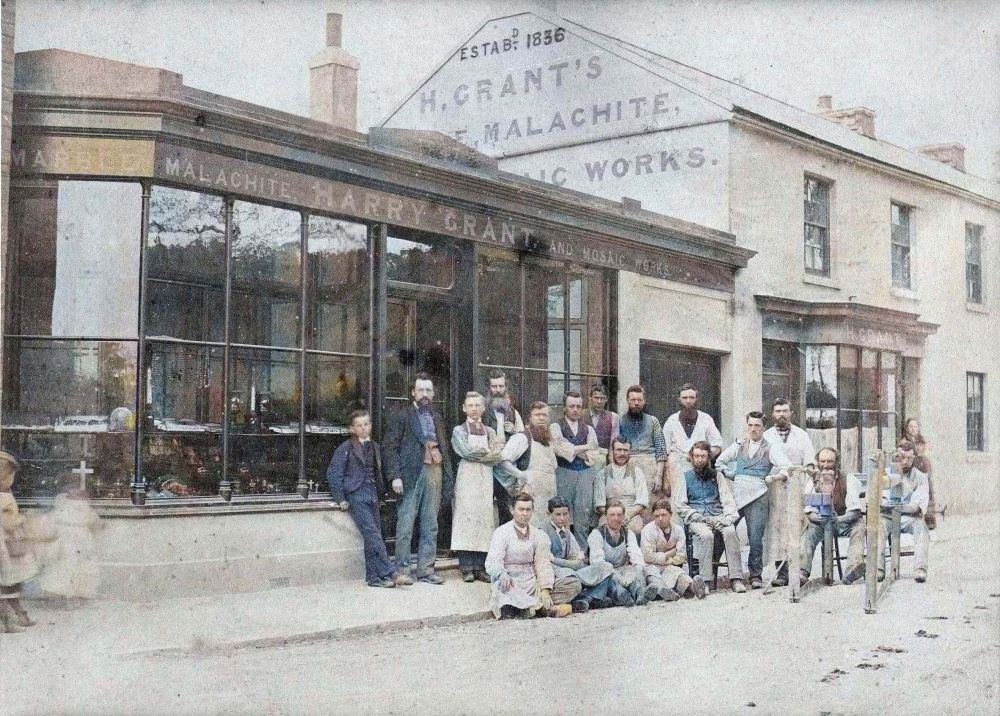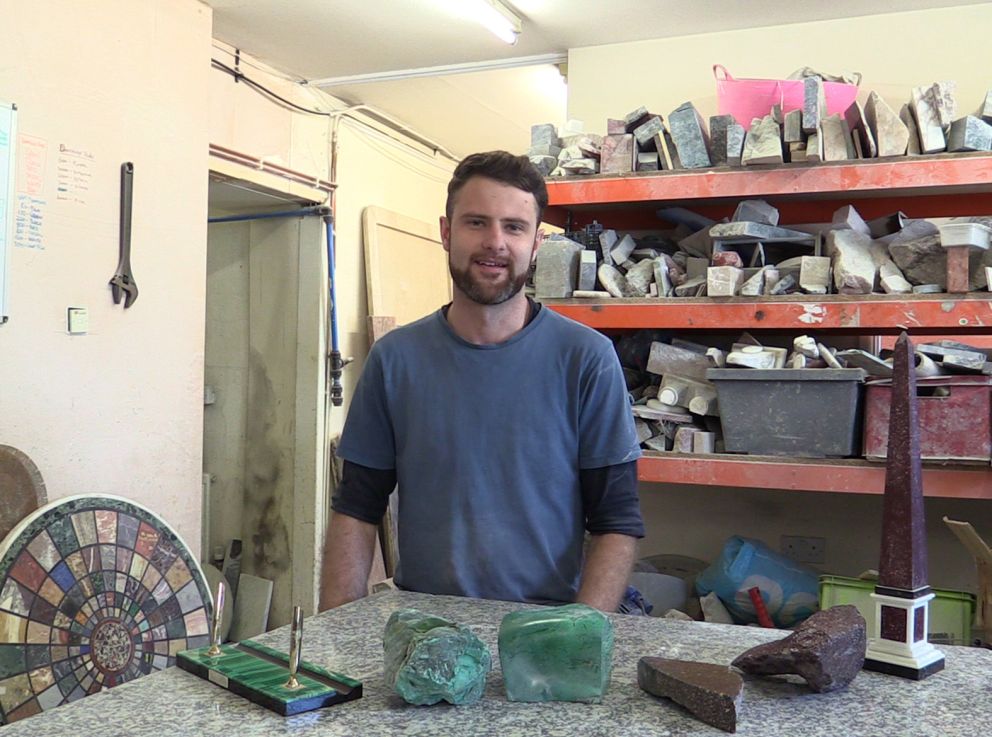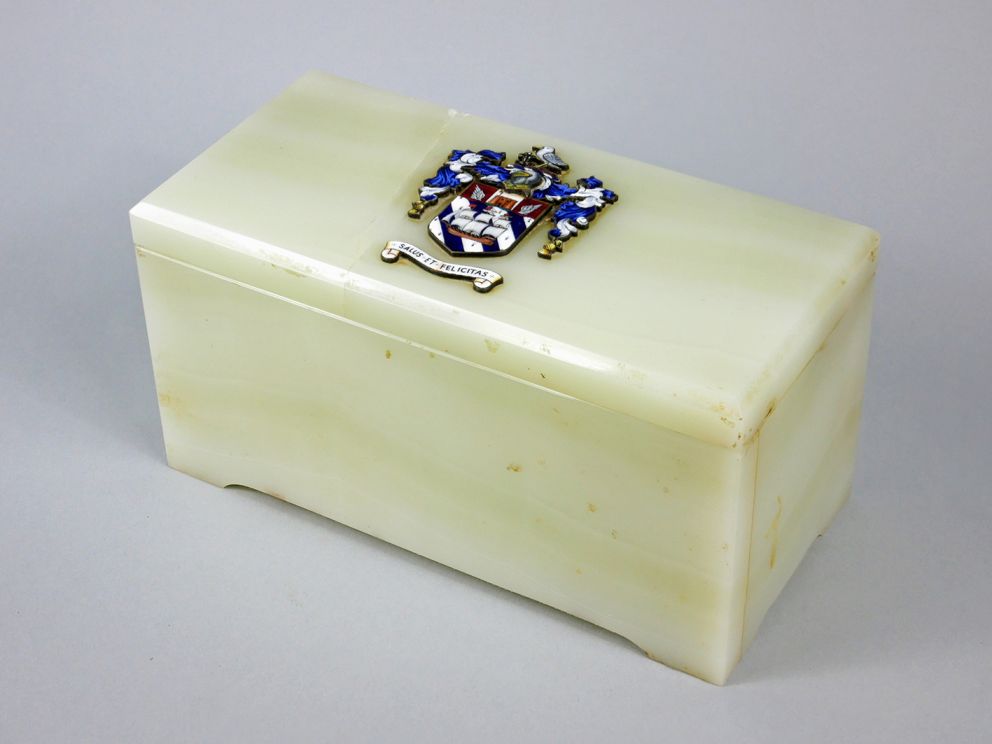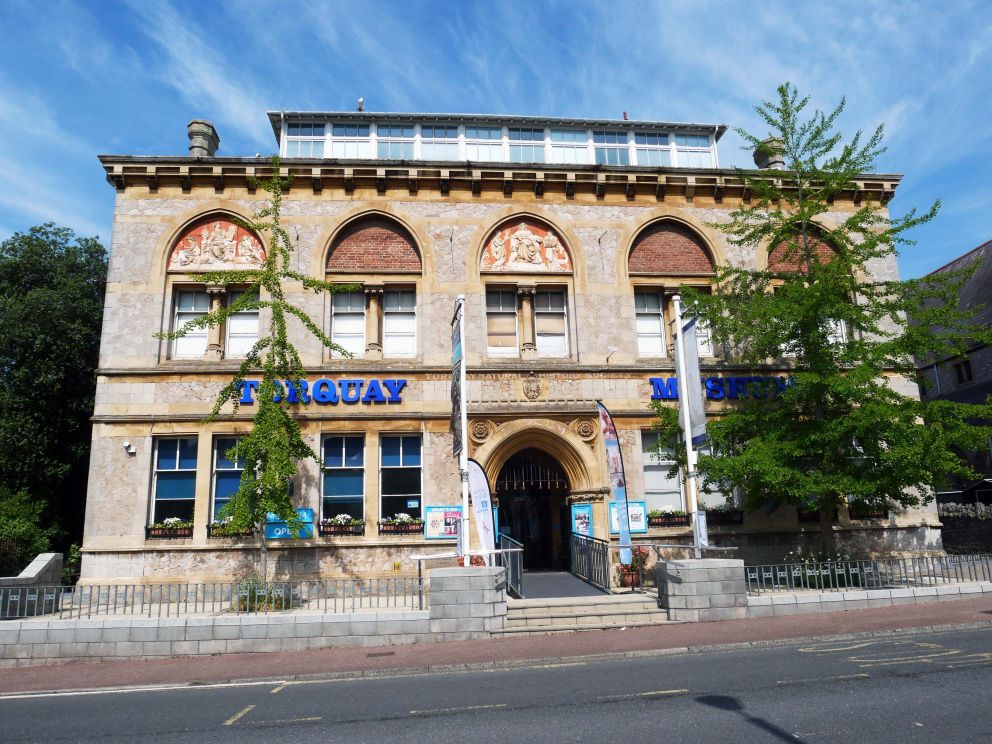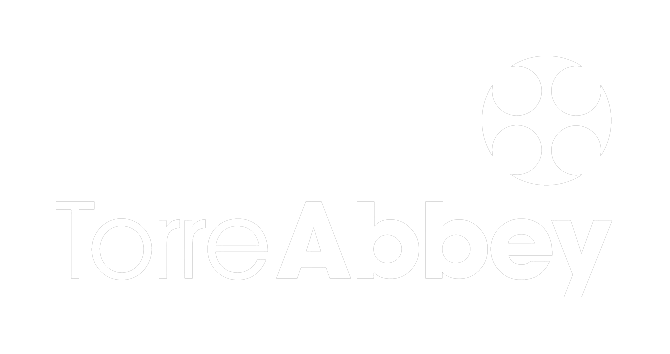Harry Grant & Sons
The story of Grants is one of a remarkable survival of a stone-working business passing through eight generations of one family. Grants was founded by Joseph Grant, a stone mason who moved to St Marychurch from Broadhempston. Initially, he worked at Petit Tor quarry with Daniel Woodley, but in 1836 he established his own stone polishing workshop.
The business was expanded by his successor Henry Grant. He had been apprenticed under Daniel Woodley and then moved on to stone polishing and jewellery making. In 1847 he joined with his brother Joseph Jnr taking on a freehold plot in Watcombe where they built a house, a workshop and six cottages. Its success soon attracted the Watcombe Terra-cotta Clay Company Ltd to a nearby site. The workshop produced polished fossil specimens, jewellery made from pebbles and a wide range of veneered (termed mosaic) objects made with local stones and malachite.
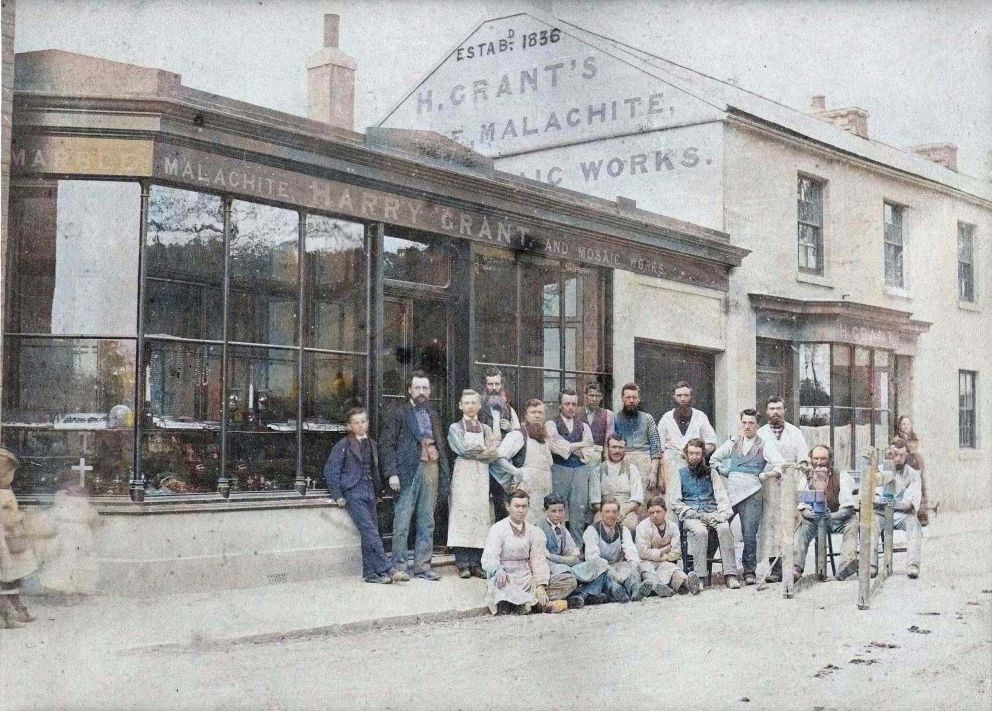
Harry Grant & Sons workforce in front of the workshop and new showroom c. 1874. The first three standing on the left are William Henry Grant (tallest centre) with his sons on either side (colourised).
Read More 

The golden age of the business came in the latter half of the 19th century under the third generation, William Henry Grant. William was ambitious and first expanded the workshop with a showroom then adding steam power for belt driven machinery. During this period many of the products were wholesaled to local shops and dealers around Britain. They produced ‘works of art in marble malachite & floral mosaics including writing sets, vases, photo frames, clock cases and mosaic and malachite jewellery’.
In 1880, after the death of one of their best local retailers, Edwin Bradford, Grants established its own direct outlet in the Rotunda in Torwood Street. This relocated to 10 Strand and was managed by William’s two children Harry and Emma Grant.
Read More 

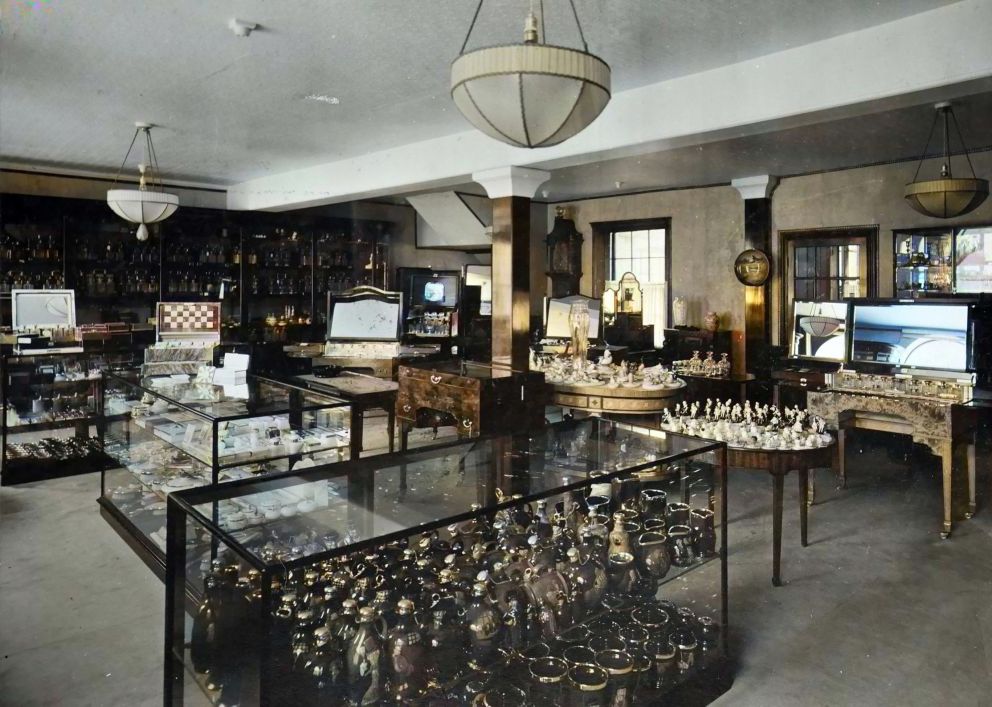
The interior of Harry Grant & Sons shop at 10 Strand. This remarkable picture from around 1900 shows the huge range of products, many in white onyx along with local pottery (colourised).
Read More 

In 1913, Grants became a private limited company but the outbreak of World War I impacted all the Torbay marble companies and forced Grants to close their shop and return to manufacturing and wholesaling.
Grants survived by diversifying. As the supplies of local stone declined, they imported more onyx and malachite and acquired the Betjeman Patent, soft closing hinge which was used on a variety of onyx boxes. They gained important contracts to supply high-end London retailers like Asprey with luxury goods.
The 20th century would see Grants open a London office and attend national trade shows. They supplied the marble façade and fireplaces to Queen Mary’s Dolls House in 1924, and a range of small items to the Queen in 1934. Grants was eventually passed to Gregory Halliday, the son of Jessie Grant. Grants of Devon Ltd is now run by Mark and Martin Halliday, the seventh and eight generations to hold the business.
Read More 

Recognising objects made by Harry Grant & Sons of Torquay
Established in 1836 and still in business today Harry Grant & Sons, now Grants of Devon Ltd is almost certainly the longest-running and most prolific decorative stone object manufacturer in the UK. For most of its history, it has been a wholesale manufacturer supplying unbranded products to retailers locally and across Britain. But for a short period, it had a retail shop in Torquay and branded at least some of its products. These provide the best indicators of the provenance of many stone objects as the work of Grants.
Grants products change considerably through time following fashions and artistic trends and can be categorized. Images held in the archive of the company also allow us to identify product types that would otherwise remain almost impossible to identify. Grants also employed certain techniques such as marble and malachite mosaic work, decorative stone onlay work as well as inlay work, and the use of decorative engraved metal. Grants had an association with Ernest Betjemann who supplied patented metalwork, his relationship was formalised in 1913 with Betjemann becoming one of the board of directors.
Read More 

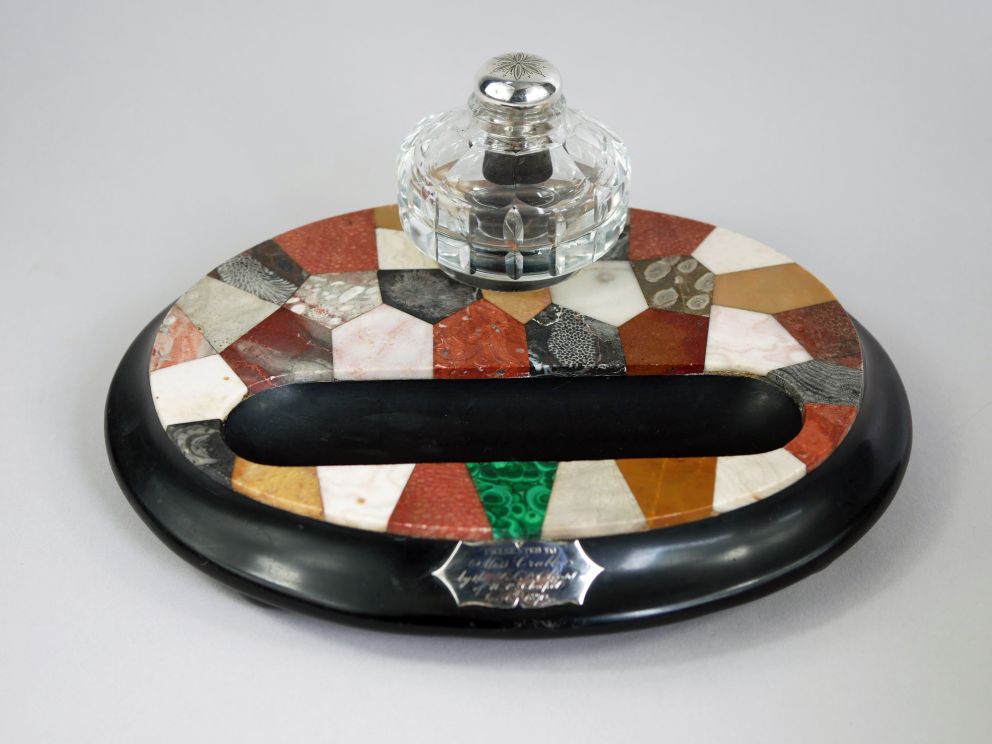
This oval inkstand is veneered with a mosaic of local marbles and a single piece of malachite. It is a rare example of a dated piece with an inscription that it was presented to Miss Crabb by the T.S.F Class of the Upton Vale Chapel on June 4th 1870. It was probably made by Harry Grant & Sons who were wholesalers at this time.
V7494.1-2
Read More 

Grants work prior to 1900
It is very rare to find a Grants makers' mark or label on items made before 1900 and they will mostly relate to items retained through firstly the Rotunda at 29 Torwood Street from 1880 and later their shop on 10 Strand which was open into the early 20th century.
Most Grants items will be unmarked. They made a range of black marble objects the majority with mosaic work finishes in local Devonshire stones but almost always incorporating a piece of Russian malachite. They also made items of black marble and only adorned with Russian malachite. They specialized in floral inlay work (Florentine Style) on small panels and larger objects such as inkstands, thermometer stands, crosses and classical-style ewers.
Read More 

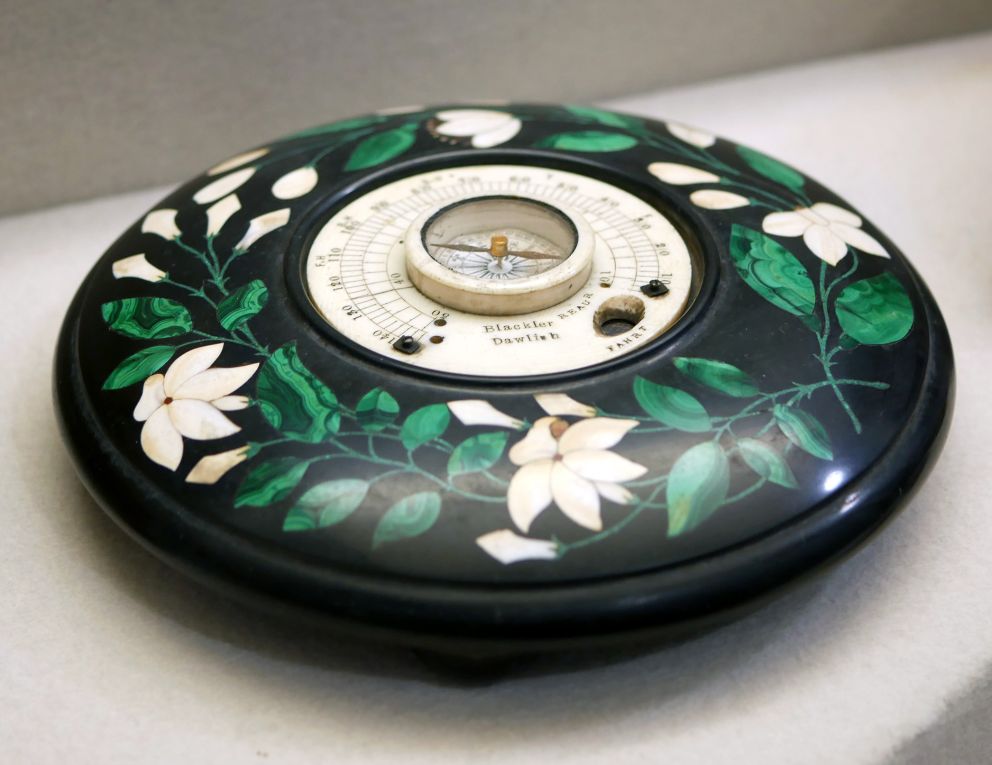
The Belgian black marble base is inlaid with malachite leaves and jasmine flowers in shell. The ivory thermometer and compass plate is marked ‘Blackler Dawlish’ dating it to between 1851-56 when Andrew Blacker had a premise at 19 Strand. The inlaid base is typical of the floral work produced at Harry Grant & Sons when they were wholesalers. They probably supplied the base with Blackler adding the thermometer plate.
V5063
Read More 

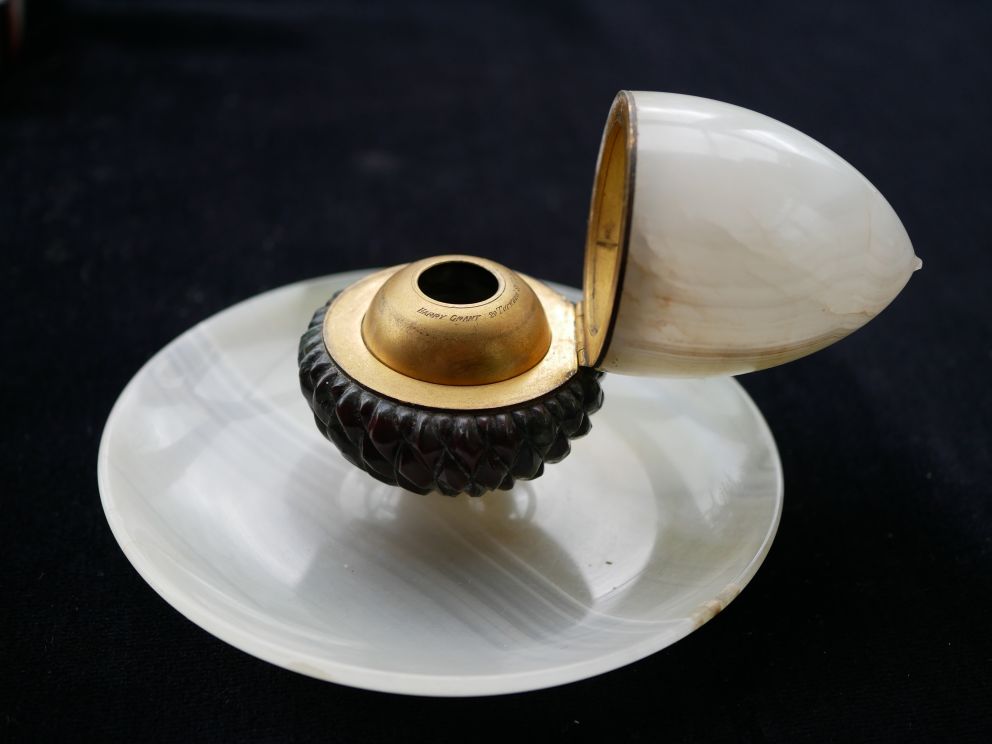
White onyx and Cornish serpentine acorn inkwell inscribed "Harry Grant 29 Torwood Street Torquay". C. 1880. Private Collection
Read More 

Grants' onlay work is particularly distinctive and has not been recognised until very recently. Onlaid items included brooches, plates, boxes, picture frames and clock cases and could be on black marbe or more commonly on white onyx imported from the Americas. The onlay work is often made from non-Devonian stones including Connemara marble but also includes carved shell, glass and paste work.
Read More 

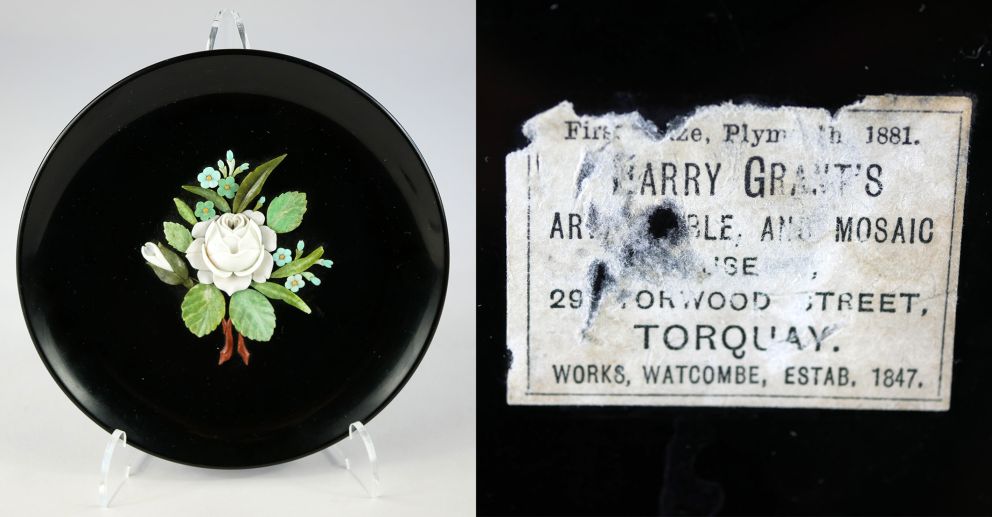
We have two onlaid black marble plates (not a matching pair) in our collection. These were made by Harry Grant’s at their works in Watcombe, Torquay and retailed through their own outlet in 29 Torwood Street, (now Amici) dating them to the 1880s. The craft of stone and shell onlay work of floral designs in non-local stones may have been unique to Grants. Their surviving pattern books show they had many different designs but because of the fragility of the items very few pieces have survived today in reasonable condition.
V7516, V7517
Read More 

Grants of Devon Ltd: Maestros in Marble
The film below tells the story of Harry Grant & Sons now Grants of Devon Ltd. Grants were one of the pioneers of the Torbay decorative stone industry. From the mid-19th century to the mid-20th century they were the most prolific producers of decorative stone objects in Britain creating high-quality items for retailers all over the UK and abroad. The business has survived since 1836, passed down through 8 generations of one family, and it still operates in St Marychurch, Torquay.
This film has been funded by The National Lottery Heritage Fund with additional support from Torquay Museum. With special thanks to Grants of Devon Ltd. The photographs in this film are courtesy and copyright of Grants of Devon Ltd and Torquay Museum. This film was made by John Tomkins of Emberlense Productions
Read More 

Restoring a Grants Onyx Casket
This film shows the restoration of an Onyx Casket by Martin Grant Halliday of Grants of Devon Ltd. The casket with an enameled Torquay Borough crest was presented to Mr Robert Rooke (Torquay Mayors’ Civic Secretary) when he was made a freeman of the town in 1968. It bears the maker’s mark of H.G.&S.
This film has been funded by The National Lottery Heritage Fund with additional support from Torquay Museum and made by John Tomkins of Emberlense Productions. With special thanks to Grants of Devon Ltd. The photographs in this film are courtesy and copyright of Grants of Devon Ltd and Torquay Museum.
Read More 

Support Torquay Museum
Did you know that whenever you buy anything online – from your weekly shop to your annual holiday – you could be raising free donations for Torquay Museum with easyfundraising? Find out how!
Stay Connected with Our Newsletter
Be the first to hear our latest news by signing up to our newsletter. Also don't forget to follow us on social media - @torquaymuseum.








